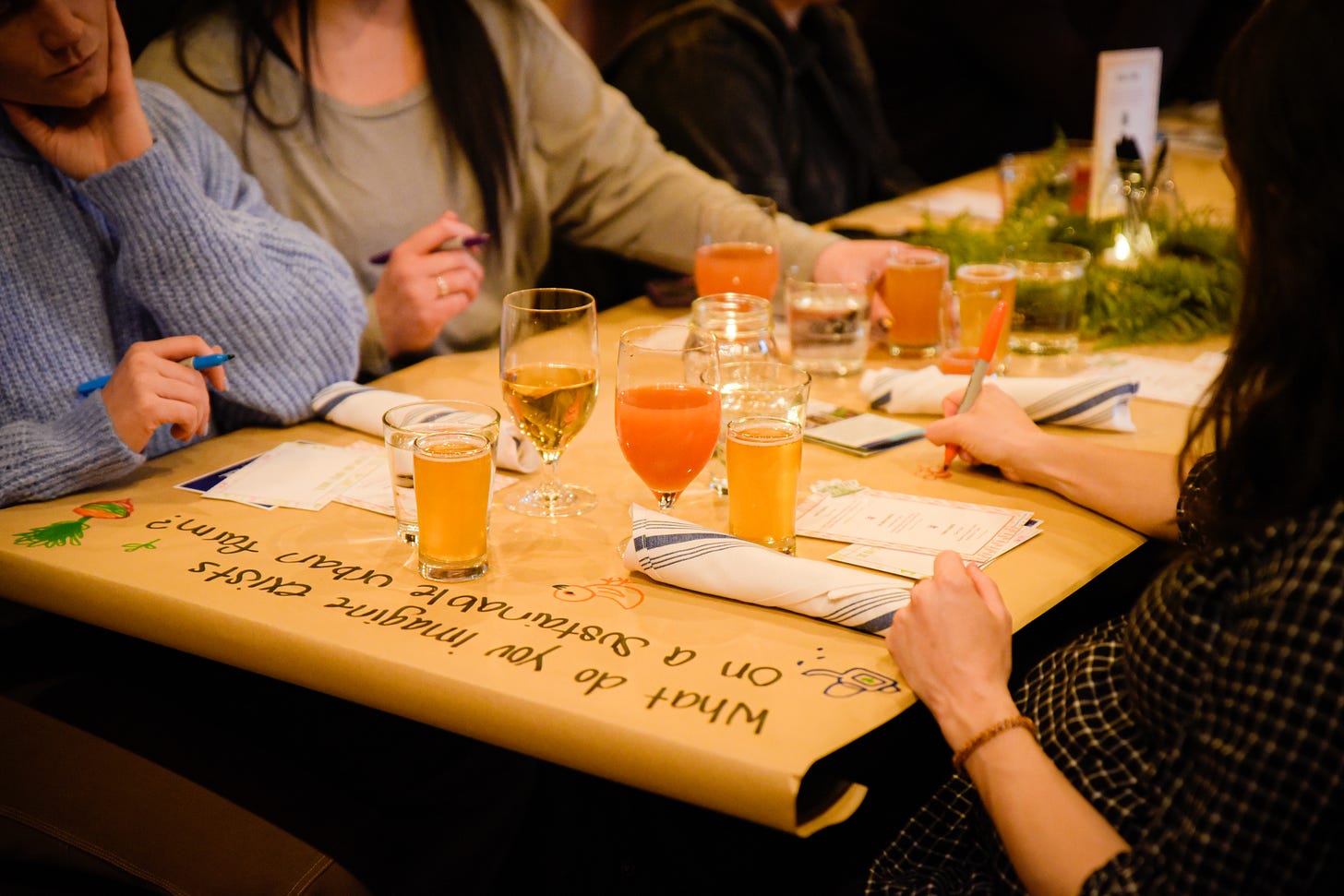Copi: We Don't Talk About Asian Carp Anymore
Also, learn about Green City Market's Sustainable Supper Series
Copi: We Don’t Talk About Asian Carp Anymore

“Tonight’s special is copi with fresh dill and roasted new potatoes.” Doesn’t this sound appetizing?
The Illinois Department of Natural Resources is banking that the new name “copi” will be more attractive to eaters than “Asian carp” — and will spark a boom in harvesting and consumption of this invasive species, which has been creating ecological mayhem in the Illinois river system and posing a threat to the fisheries of the Great Lakes.
The state agency this morning presented a live-streamed announcement of the name change to copi from Asian carp.
The presentation — which began with a short, well-produced documentary about the fish — included local culinary stars who have taken a lead in selling Asian carp as food: Brian Jupiter of Frontier restaurant in the West Town neighborhood (who had the honor of revealing the new name), Beverly Kim of Wherewithall and Parachute restaurants in the Avondale neighborhood, and Dirk and Terry Fucik of Dirk’s Fish and Gourmet Shop in Lincoln Park. Longtime TV food journalist Steve Dolinsky served as emcee.
The idea of promoting Asian carp as a food fish, which has been gently pushed for a number of years, has suffered from a couple of major factors. One is its status as an invasive species that is the focus of major efforts to ensure that it does not get into Lake Michigan, which makes it sound pretty bad. The other is misunderstanding that these fish, like most other carp, are bottom feeders. Copi, the fish formerly known as Asian carp, is in fact a top feeder that those culinary experts say has a clean, fresh and delicate taste.
So why “copi?” It is short for “copious,” which gets to the heart of the problem.
Asian carp were introduced to the United States about 60 years ago to help control certain water plants that were causing problems for those practicing aquaculture. But it was one of those environmental experiments that went bad. Some of the fish escaped into the wild and worked their way into Midwestern river systems where they have reproduced — abundantly. So much so that, according to IDNR, this invasive species now makes up 70 percent of the fish population by weight in Illinois rivers, and is outcompeting some of our native species for aquatic food sources.
The idea of the name change is to create a bigger consumer market that will in turn incentivize those who make their living catching fish to harvest and thin the schools of copi.
I’ll have more to say about copi soon, including a taste test or two. In the meantime, to learn more, visit choosecopi.com.
Green City Market’s Sustainable Supper Series

As the only publication promoting the Chicago region’s farmers markets on practically a daily basis, I don’t play favorites. Yet there’s no denying that my longest and deepest relationship is with Green City Market in Lincoln Park.
It has been our local market (2 miles away) since we moved to Chicago almost exactly 11 years ago. It was where I first started developing my relationships in the local food community and where today I personally know the most farmers and vendors.
So I am happy to share the following contributed article by Grace Novacek, Green City’s Program Manager, about the nonprofit’s Sustainable Supper Series, at which great food is paired with conversation about big issues affecting local food.
That said, Local Food Forum welcomes other markets to contribute content about the great work they are doing. Send me a note at bob@localfoodforum.com.
_______________
Green City Market (GCM), the nonprofit organization behind Chicago’s premier sustainable farmers markets in Lincoln Park and the West Loop, is hosting our first series of local food-focused dining experiences this year: the Sustainable Supper Series!
So far, GCM has hosted two sustainable suppers, the first in March at Big Delicious Planet, a farm-to-table catering company in the West Town neighborhood that sources ingredients from their on-site urban farm, and the second in April at Cultivate by Forbidden Root, a vegetable-forward pub and botanical-inspired brewery in the Ravenswood community.
At Green City Market, our team is on a mission to secure the future of food by deepening support for sustainable farmers, educating our community and expanding access to locally grown food — our three pillars.
While our Wednesday and Saturday farmers markets in Lincoln Park and our Saturday-only market in the West Loop are our best-known program, Green City puts on a variety of programming, designed with our three mission pillars in mind.
This is why we created the Sustainable Supper Series as a space to foster educational, interactive conversations about the local food system.
Each event includes a three-course meal and beverage pairing, and features a lively panel discussion about the local food system led by Mandy Moody, Green City Market’s Executive Director. Kicking off the series in March 2022, GCM invited Hayden Holbert, owner of Wisconsin’s Avrom Farm and long-time market vendor, , and Heidi Moorman Coudal, owner and culinary director of Big Delicious Planet, to explore the topic, “What is local food, really?”
The event series continued in April, when we were joined by two leading growers from Chicago’s South Side, Stephanie Dunn of Star Farm Chicago and Janelle St. John of Growing Home, to discuss the importance of community and nonprofit urban farming.
The Sustainable Supper Series highlights local sustainable farmers because community members so rarely get the chance to hear firsthand from farmers about how we can support their work. Our investment in their business, material or otherwise, affects what they’re able to accomplish. For instance, supporting Star Farm and Growing Home broadens their abilities to provide job training and community resources, and supporting Avrom Farm allows them to expand their regenerative agriculture practices.
Showcasing these farms can also broaden our ideas of what a farm looks like! Avrom Farm is unique in that the entire staff (including owner Holbert) is under the age of 30. Growing Home and Star Farm provide job training for folks interested in farming at any point in their lives, reinforcing that the next generation of farmers can be cultivated at any age.
Green City Market believes in fortifying and expanding relationships between farmers and members of the culinary community in order to deepen support for sustainable farming and bolster the next generation of farmers in the Midwest. GCM believes it is absolutely crucial that we foster a community around sustainable food, and encourage a learning environment for people of any age to come and engage with the local food system.
Although these two suppers have passed, we still have plenty of events coming up in the future that were developed with these goals in mind. We have two more Sustainable Suppers in October and November — stay tuned for panel guests, restaurant details, and ticket sales.
And don’t forget our Chef BBQ, which is both the biggest fundraiser for GCM’s programs and the most anticipated annual tasting event in Chicago. Chef BBQ 2022 is scheduled for September 8 and tickets go on sale soon.
During peak harvesting season, we’re focused on our markets, which are in Lincoln Park on Wednesdays and Saturdays from 7 a.m. - 1 p.m. and in the West Loop on Saturdays from 8 a.m. - 1 p.m., from May to November. But when the season ends in November, it doesn’t mean our programming is ending! In the fall, we have plenty of opportunities for members of our community to get involved and learn about sustainable farming and local food.
Green City Market’s events give you the chance to connect with your community and meet new people, and to brainstorm about what our role in the local food system can look like. Sharing a meal is a sweet and intimate way to do so. Look out for more details about the next Sustainable Supper coming soon and subscribe to the Green City Market newsletter to stay connected.





